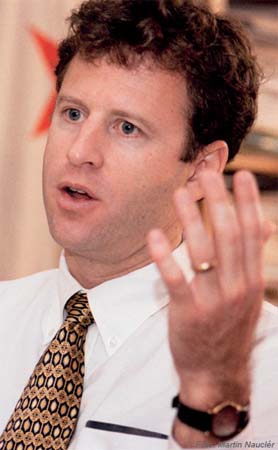
"In America, you have to be lucky or rich to get proper care for your young autistic child. Treatment regimens typically cost more than $50,000 annually for preschool children ó one reason proven methods are available to perhaps only 10 percent of afflicted children during those crucial years. In a few states, like New Jersey, educational systems provide therapy to preschool kids, but resources vary from county to county. Here in Maryland, our 4-year-old daughter has received an hour or two of publicly provided help a week; studies show that ideally up to 40 hours of intensive intervention are required. A handful of states, including Maryland, have established a Medicaid autism waiver to allow parents of severely afflicted children to obtain relevant services independent of income." Michael O'Hanlon, a Senior Fellow at the Brookings Institute and a Visiting Lecturer at Princeton University, served as a Peace Corps Volunteer in Congo Kinshasa.
Michael O'Hanlon writes: Studying Autism Isnít Enough
Studying Autism Isnít Enough
By CATHRYN GARLAND and MICHAEL O'HANLON
Published: November 21, 2006
WITH the recent Senate passage of the Combating Autism Act, the House is now poised to approve landmark legislation to help scientists understand the causes and characteristics of autism ó a spectrum of neurological disorders affecting more than 1 in 200 children in the United States. If the House does as we hope and passes the act, the National Institutes of Health and related health research agencies will finally begin to devote the magnitude of resources ó nearly $200 million a year ó commensurate with the severity and prevalence of this terribly devastating set of conditions.
The research emphasis of the act is appropriate, given how little is still known about the causes and the physiology of autism spectrum disorders, as well as the means by which medical treatments can reduce autismís severity if applied early enough. Basic questions like whether the frequency of childhood vaccines today contributes to autism are still unresolved.
As parents of a child facing these challenges, we applaud those lawmakers and fellow parents who have done so much to promote this and other initiatives. But research is not enough. We as a nation must also begin to focus seriously on treating those children who are already afflicted. At present, we are failing miserably to do so.
In America, you have to be lucky or rich to get proper care for your young autistic child. Treatment regimens typically cost more than $50,000 annually for preschool children ó one reason proven methods are available to perhaps only 10 percent of afflicted children during those crucial years. In a few states, like New Jersey, educational systems provide therapy to preschool kids, but resources vary from county to county. Here in Maryland, our 4-year-old daughter has received an hour or two of publicly provided help a week; studies show that ideally up to 40 hours of intensive intervention are required. A handful of states, including Maryland, have established a Medicaid autism waiver to allow parents of severely afflicted children to obtain relevant services independent of income.
But limited funds constrain those services even where they exist. Earlier this year, we put our daughter on Marylandís autism waiver waiting list ó and were told that she was No. 1,519, corresponding to an expected delay of several years before services would be available.
We are still lucky. Thanks to the farsightedness and generosity of one of our employers, most of the money needed for our daughter is provided via insurance. But among major American corporations, only Microsoft, Home Depot and two or three others offer comparable benefits. Virtually no private health plans do. The Department of Defense has some, though it has been introducing bureaucratic obstacles to obtaining coverage that could make it inaccessible for most as a practical matter.
If we do not help these children, we are essentially condemning them to a lifetime of disability, unemployment and, for many, institutionalization. On human grounds, this is tragic. But itís also bad economics. The few hundred thousand dollars needed to do intensive early intervention for four or five years ó while a lot ó is only one-tenth the expected cost of supporting someone for a lifetime on the dole.
Intervention is costly because it is essentially one-on-one. Youngsters with autism spectrum disorders are hard to engage. They do not closely observe their environment or naturally imitate the actions of others. Nor do they tend to seek out human interaction and communication. Overcoming these barriers requires a highly individualized and intensive program. There is broad consensus, as reflected in previous studies by the National Academy of Sciences and American Academy of Pediatrics, that early and intensive intervention is critical. The core of most intervention plans, it is generally agreed, should be a cognitive method engaging the childís intellect and emotions and sociability.
Insurance companies and others often deny coverage by arguing that treatment methods are experimental, but that assertion no longer holds water. Studies now show that 40 percent to 50 percent of toddlers undergoing intensive Applied Behavior Analysis, one of the best-known methods, can be mainstreamed in regular classrooms without personal aides by the time they reach school age. (The figure is close to zero for children not given special care.) Most of the other 50 percent to 60 percent make notable progress too. The applied behavior method breaks down learning into simple steps with one-on-one tutoring, in a manner somewhat akin to the way Helen Keller was taught. Other applied behavior approaches involve reinforcing appropriate behaviors in daily life and creating opportunities for social interaction.
In the early 1990s, Dr. Stanley Greenspan developed a competing method. Commonly known as Floortime, it focuses on core autism deficits ó emotional, social and imaginative abilities ó by harnessing a childís natural interests and tailoring interactions to specific skills and challenges. It involves interactive play, as well as activities that vary a childís environment to teach language concepts in a realistic way.
At a conference last December at the Brookings Institution, Dr. Greenspan, while making a strong case for Floortime, also recognized applied behaviorís potential for children on the autism spectrum. As parents using a blend of approaches with our child, we have been encouraged to see that they increasingly draw on one anotherís insights and activities. (A third cognitive method, called relationship development intervention, also focuses on core autism deficits.) So while vigorous debate continues over optimal therapy, there is no longer any doubt that the main methods work.
Once the Combating Autism Act is passed, and we hold out hope for the next generation, it is time to rescue the children who already are afflicted. Our options range from mandating that insurance companies cover therapies documented to work, to trumpeting the example of places that do provide coverage in the hope others will follow, to expanding autism Medicaid waivers.
The autism community is encouraged by the recent attention to this profound set of disabilities. But as a nation, we have been letting down 25,000 more children every year. Good will is not enough.
Cathryn Garland is a director at Discovery Communications. Michael OíHanlon is a senior fellow at the Brookings Institution.

















